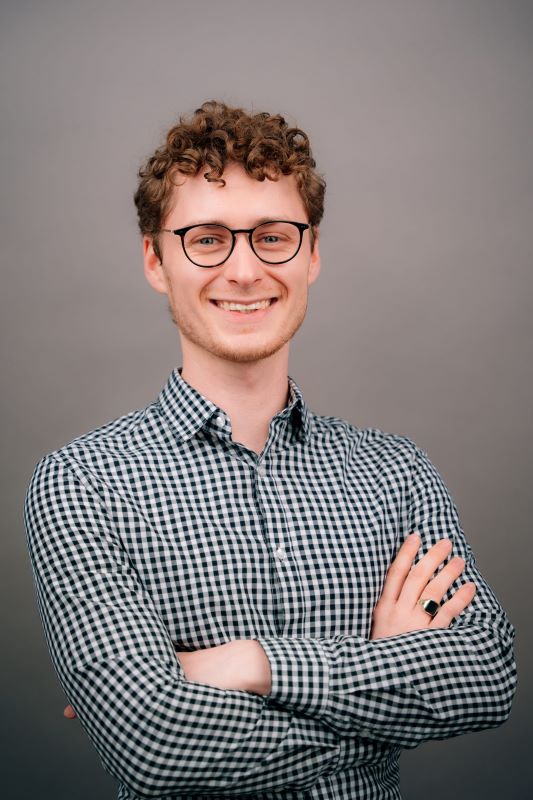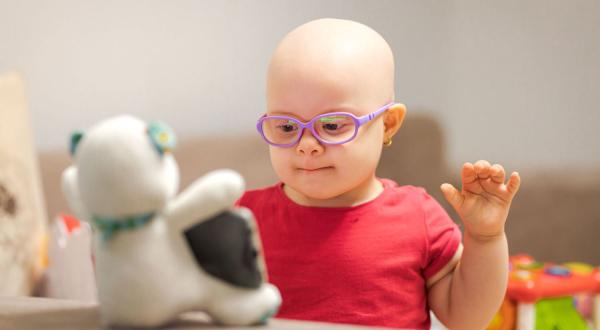RSU international student: future doctors here meet with patients more often than at German universities
"I strongly disagree with the notion that Latvians are cold," says Lucas Risters, a German-British medical student currently living and studying in Riga. He believes Latvians possess a warmth and openness that Latvians do not see in themselves. Five years ago, driven by a kind of ambition, Lucas packed his things and came to study in an unfamiliar country. Here he encountered various academic challenges, surprises about Latvia, and ultimately a new and beautiful life for the long term.

Lucas is currently in his 5th year and plans to specialise in radiology and continue working in Latvia. He shares his thoughts on studying medicine at Rīga Stradiņš University (RSU), integrating into Latvian society and his vision of the healthcare system in Latvia compared to Germany.
You were sure you wanted to study medicine already from childhood. Usually this means that students start preparing to enrol at the best universities early. What was your motivation to study medicine in Latvia?
It wasn't really motivation per se, but more of a “back off!” kind of mindset. I’ll explain why. In the UK, you have to pass an admission exam to enrol at medical school. I didn't do too well the first time, but I succeeded on the second try. I got a place and was very proud of this, of course.
At the time, however, my mother was the head of the programme. When I told people that I got in, they said: "Well of course you got into the school because your mother sorted it out for you!" Then I felt like, "Alright, to hell with it!" I wanted to prove that I could get into a university because of my abilities, not because my mother had arranged it for me.
That same evening, I looked for medical programmes in lesser-known countries. The reason I chose Latvia and Rīga Stradiņš University (RSU) was because I had the opportunity to start my studies in October, which is when I was in this "back off!" mood.
What was your first impression when you started studying in Latvia?
It was very interesting to meet people from all over the world. You sit in a classroom and hear so many different languages being spoken. It was confusing and interesting at the same time.
What is the biggest difference in medical studies that you noticed in Latvia compared to Germany?
I think the biggest difference is how practical and theoretical classes are conducted. In Latvia, you sit in a lecture room and discuss the problem, and then you usually go straight to the patient with a specific syndrome or disease.
You end up seeing patients almost every day. In Germany, meanwhile, students gain practical experience mainly during the semester break.
I am very satisfied with my studies. Of course, international students are homesick, especially in the first semester. They miss their families. We have to learn to live with that.
What do you think of the people in Latvia? Do you feel that we are more reserved, cold, or introverted?
Not at all. Of course, people in Latvia are very different from Germans, who are very loud and extroverted. However, I am also from the UK and knowing that environment, being quiet is nothing unusual, as people in the UK are also very polite and reserved.
I also strongly disagree with the statement that Latvians are cold. If you try to speak Latvian, you get warmth and openness in return.
Do you have any advice for other German students considering studying medicine in Latvia?
Definitely. Reach out to local students from day one! Getting to know local students not only gives you useful information about your studies, but also about the country and culture. I also think that if I hadn't made Latvian friends, I wouldn't have considered staying here. Before, I knew nothing about this country and its culture.
I knew only a few cities outside Riga. Since I have my Latvian friend group, we go travel around the country and they invite me along.
I really fell in love with this country and its culture.
Whether you want to have a good time or study for the rest of your life, make friends with the locals!
Let's talk about life in Latvia. What have been the biggest challenges? What surprised you the most?
The weather surprised me the most – minus 20 degrees! But you get used to it. It was also difficult to integrate at times, but I'm not sure if all international students would agree with me on that.
A few years ago, it seemed to me that a large part of society here (not young people) was not very open to foreigners.
For example, if you wanted to approach someone in a supermarket to ask them in your poor Latvian: "Where are the tomatoes?" – people usually just said: "No!" and walked away. Now, I think that has changed dramatically. That might be because I speak Latvian better and understand the culture and how people communicate.
But it also seems to me that there has been a distinct shift towards the West in the last five years. I am not saying that there was an Eastern orientation here before, but Latvia is even more oriented towards Europe now.
It is much easier for foreigners to integrate than it used to be.
What are your plans for life in Latvia after your studies?
I plan to get my Latvian language certificate by the end of the year so that I can apply for residency next year. I have a home here, a group of friends whom I call my Riga family. I just need the language certificate and the job benefits that come with it.
Written by: Ēriks Gorda (Latvijas Avīze)
How many international students are there at RSU?
This semester, RSU has 2,882 international students from 75 countries. Among them:
Faculty of Medicine – 2,527 students (87.7 %)
Faculty of Dentistry – 323 students (11.2 %)
Faculty of Social Sciences – 27 students (0.9 %)
Faculty of Health and Sports Sciences – 1 student (0.03 %)
Faculty of Residency – 3 students (0.1%)
Department of Doctoral Studies – 1 student (0.03 %)
Top countries that RSU international students come from:
- Sweden - 31.89%
- Germany - 21.83 %
- Finland - 13.08%
- Norway - 9.13 %
- Italy - 3.5%
- Portugal - 2.85%
- India - 2.64%
- United Kingdom - 1.35%
- Israel - 1.18 %
- Sri Lanka - 1.1%
Related news
 RSU researchers explain how digital technologies help paediatric oncology patientsRSU in the news, Consolidation, Research
RSU researchers explain how digital technologies help paediatric oncology patientsRSU in the news, Consolidation, Research


